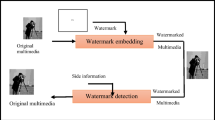Abstract
Image-Adaptive watermarking systems exploit visual models to adapt the watermark to local properties of the host image. This leads to a watermark power enhancement, hence an improved resilience against different attacks, while keeping the mark imperceptible. Visual models consider different properties of the human visual system, such as frequency sensitivity, luminance sensitivity and contrast masking. Entropy masking is another human visual system’s characteristic, which rarely has been addressed in visual models. In this paper we have utilized this masking effect to improve the robustness of Image-Adaptive watermarks while keeping their transparency. Experimental results show a significant amount of enhancement to the power of watermark. The work has been expanded to video watermarking, considering special properties of the entropy masking effect.
Preview
Unable to display preview. Download preview PDF.
Similar content being viewed by others
References
Cox, I.J., Kilian, J., Leighton, T., Shamoon, T.: Secure spread spectrum watermarking for multimedia. NEC Research Institute Tech. Rep. 95-10 (1995)
Podilchuk, C.I., Zeng, W.: Image-Adaptive Watermarking using visual models. IEEE Journal on selected areas in communications 16(4), 525–539 (1998)
Watson, A.B.: DCT quantization matrices visually optimized for individual images. In: Proc. SPIE Conf. Human Vision, Visual Processing, and Digital Display IV, February 1993, vol. 1913, pp. 202–216 (1993)
Safranek, R.J., Johnston, J.D.: Perceptually based prequantization for image compression. In: Proc. SPIE Conf. Human Vision, Visual Processing, and Digital Display V (1994)
Peterson, H.A., Ahumada Jr., A.J., Watson, A.B.: Improved detection model for DCT coefficient quantization. In: Proc. SPIE Conf. Human Vision, Visual Processing, and Digital Display IV, February 1993, vol. 1913, pp. 191–201 (1993)
Watson, A.B., Borthwick, R., Taylor, M.: Image quality and entropy masking. In: Proc. SPIE Conf., vol. 3016 (1997)
Kim, S.W., Suthaharan, S.: An entropy masking model for multimedia content watermarking. In: Proc. 37th Hawaii International Conference on System Sciences (2004)
Author information
Authors and Affiliations
Editor information
Editors and Affiliations
Rights and permissions
Copyright information
© 2005 Springer-Verlag Berlin Heidelberg
About this paper
Cite this paper
Sadr, A.H., Ghaemmaghami, S. (2005). Robustness Enhancement of Content-Based Watermarks Using Entropy Masking Effect. In: Barni, M., Cox, I., Kalker, T., Kim, HJ. (eds) Digital Watermarking. IWDW 2005. Lecture Notes in Computer Science, vol 3710. Springer, Berlin, Heidelberg. https://doi.org/10.1007/11551492_34
Download citation
DOI: https://doi.org/10.1007/11551492_34
Publisher Name: Springer, Berlin, Heidelberg
Print ISBN: 978-3-540-28768-1
Online ISBN: 978-3-540-32052-4
eBook Packages: Computer ScienceComputer Science (R0)




